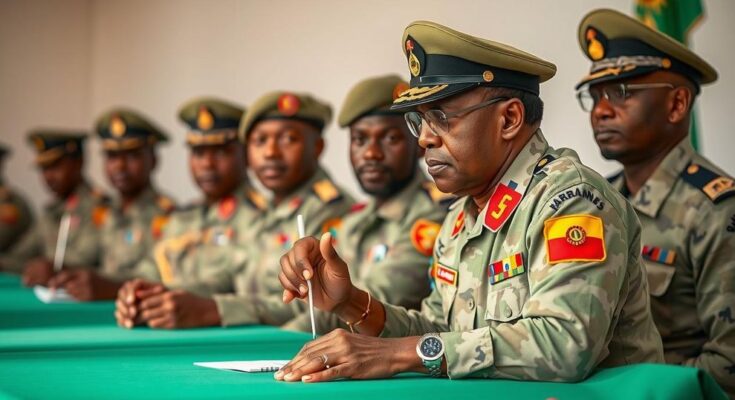Chad held a general election amidst military rule with a reported 38% voter turnout. Opposition factions urged a boycott, claiming pre-determined results, while President Mahamat Idriss Deby encouraged participation. Concerns over electoral integrity and pressing societal issues, including climate change impacts, influenced voter sentiments. Observers noted challenges in executing a transparent electoral process amidst regional instability.
Chad conducted a general election on Sunday amid ongoing military rule, a pivotal moment according to the government towards restoring democracy. Voter turnout was reported at a mere 38 percent as significant opposition factions called for a boycott, claiming the election results had been predetermined. Despite low engagement, the ruling party’s candidates could benefit from this apathy, with President Mahamat Idriss Deby Itno urging citizens to participate actively in the voting process.
Election officials attributed the low turnout to “cold weather,” downplaying the overall public disinterest. Opposition leader Succes Masra emphasized that the majority of voters heeded the boycott, asserting, “the overwhelming majority” has remained home. On the other hand, President Deby, who recently legitimized his rule through a contested election, encouraged citizens through social media to participate in this significant electoral event.
Among those who did vote, sentiments varied greatly. Some expressed skepticism about the efficacy of their vote, while others hoped for comprehensive reforms, including economic improvements and enhanced social justice. Yet, reports of disappearing ballots and allegations of pre-determined outcomes raised concerns about electoral integrity—a consistent theme in Chadian elections.
The polling process also reflected the pressing issues faced by various communities, such as the nomadic populations affected by climate change. Observers noted that local representatives were seeking commitments from elected officials to improve their conditions. Foreign observers monitored the process, though the opposition claimed electoral fraud had already been orchestrated.
The thematic backdrop to these elections includes the persistent threat of violence from the jihadist group Boko Haram and geopolitical tensions involving Chad’s role in neighboring crises. The government positions these elections as a critical juncture in the transition towards democracy, following the ascent of President Deby after his father’s long tenure, affirming a commitment to restoring democratic governance in Chad.
Chad, which has experienced a transition from decades of authoritarian rule, has been under military control since the death of President Idriss Deby in April 2021. Power transitioned to his son, Mahamat Idriss Deby Itno, who has since faced significant opposition striving for democratic reforms. The general election of 2023 is viewed as crucial both for national governance and for the cultivation of public trust in the previously beleaguered electoral process. Various factions within the opposition have expressed dissatisfaction with the electoral conditions, citing a lack of fairness and transparency.
The recent general election in Chad, amid calls for a boycott and allegations of electoral fraud, highlights the ongoing struggle for democracy in the nation. With low voter turnout and unrest surrounding the election process, the future of Chadian political stability remains uncertain. Observers remain vigilant, and the echoes of public sentiment around economic improvement and social justice persist as key indicators of the nation’s political landscape going forward.
Original Source: www.communitynewspapergroup.com




